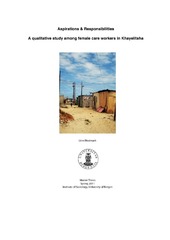| dc.description.abstract | In 1997 the South African Department of Social Welfare presented the White Paper for Social Welfare as a strategy to compensate for the apartheid regime's exclusion of the black majority for decades. In this document they employ human development in to the welfare policy. They are stressing people as agents in development processes, and recognise informal, community-based organisations as some of their most important partners in the provision of welfare services. In these organisations there is a majority of women working. The Department of Social Welfare do to some extent acknowledge women's important care work in families and communities, and their very important role in social development generally. However, there seems to be missing a discussion of the gendered division of such care work. In this thesis I will explore the ways in which the South African approach to welfare both brings agency and opportunities to women in Khayelitsha, a township outside of Cape Town, and how it seems to undervalue their care work, and serve to reinforce gender inequalities. I have interviewed ten women working for four different organisations that are located within the communities Site C and Kuyasa in the township Khayelitsha. I have also done participant observations, mostly at the soup kitchen Iliso Care Society. As theoretical framework for this thesis, I have drawn on different aspects in the human development discourse that South Africa has adopted into their welfare policy. Two central scholars within this discourse are Amartya Sen and his capability approach, and Arjun Appadurai and his notion of aspirations, capacity and capability. Further I will argue that there is a need to explore caring practices in development processes more thoroughly in order to avoid a possible reinforcement of gender inequality. I will thus draw on literature stressing the importance of social policy and care as a relational and contextual concept. This will be done by looking at Wærness' term the rationality of caring (1987), followed by a suggestion of adding an ethic of care as a new dimension in human development, drawing on Joan Tronto's (1993) four elements on an ethic of care. | en_US |
